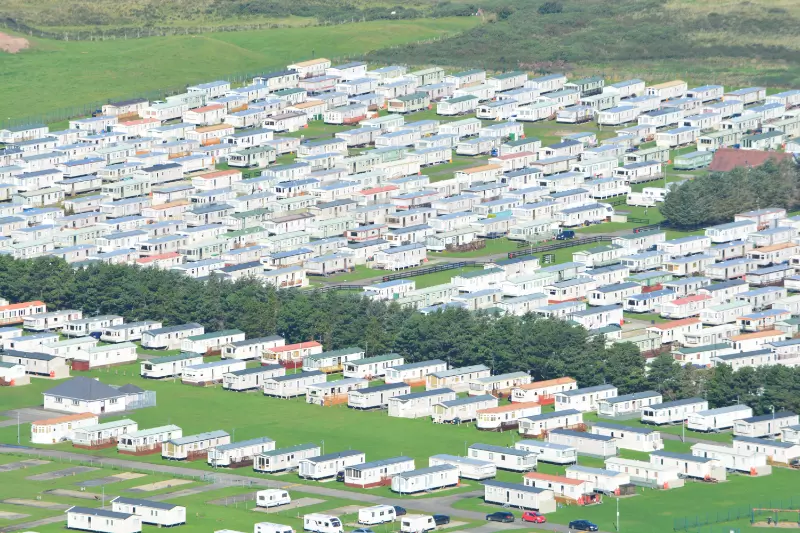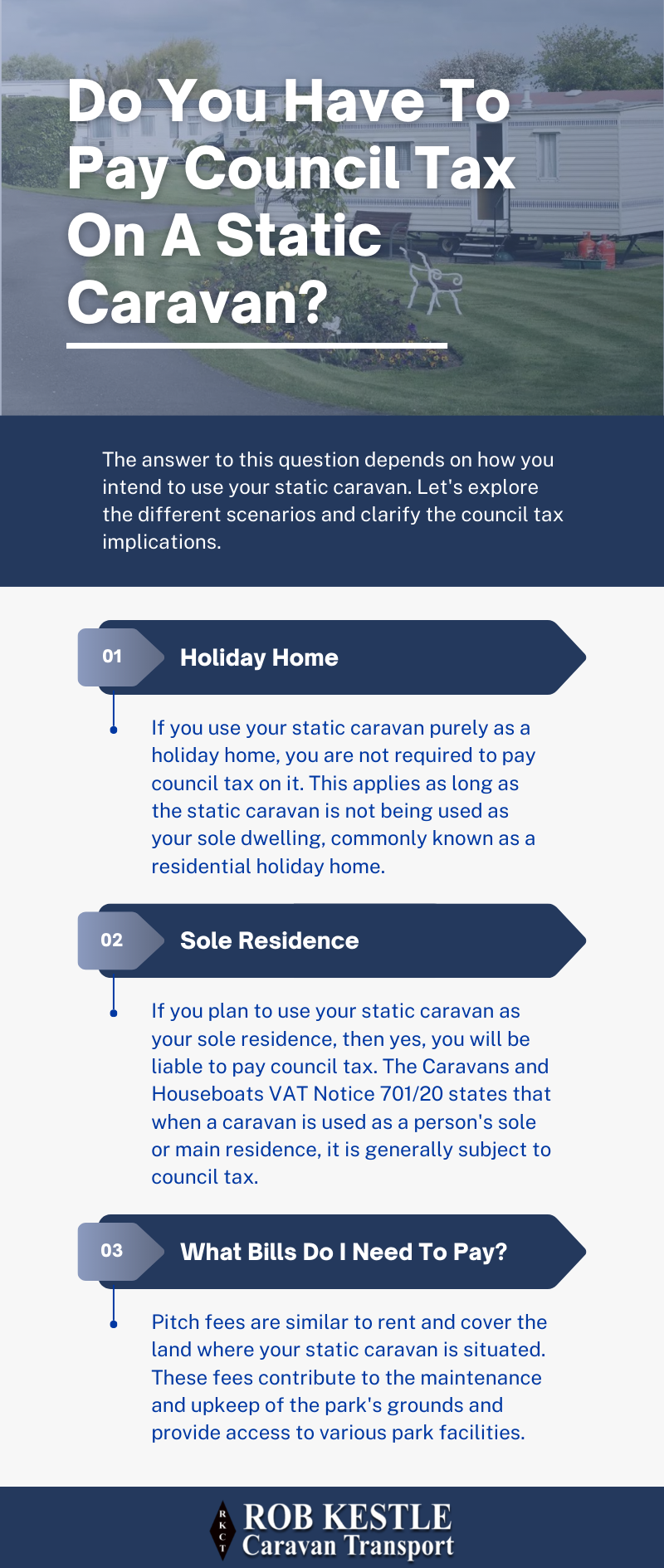Are you asking; do you have to pay council tax on a static caravan? Our guide breaks down the essentials. Learn about the potential council tax obligations, exemptions, and key considerations for static caravan owners.
Stay informed about the financial aspects and legal requirements to make the right decisions for your property. Rob Kestle Caravan Transportation provides static caravan transport throughout Devon, Cornwall and South England. Explore worry-free caravan ownership with expert insights.
Do I Have To Pay Council Tax on a Static Caravan?
If you're considering buying a holiday home, lodge, or static caravan, one question that often arises is whether you have to pay council tax on your static caravan. The answer to this question depends on how you intend to use your static caravan. Let's explore the different scenarios and clarify the council tax implications.
The good news is that if you use your static caravan purely as a holiday home, you are not required to pay council tax on it. This applies as long as the static caravan is not being used as your sole dwelling, commonly known as a residential holiday home. In the UK, holiday parks where static caravans are located are classified as commercial properties, and therefore, they are exempt from council tax.
So, if you have a static caravan that is solely used for recreational purposes, such as weekend getaways or holiday breaks, you won't be liable for council tax.
It's important to note that this exemption is applicable only if you already pay council tax on your main property. Some holiday parks may even request proof of council tax payment on your primary residence before allowing you to purchase a static caravan.
If you plan to use your static caravan as your sole residence, then yes, you will be liable to pay council tax. The Caravans and Houseboats VAT Notice 701/20 states that when a caravan is used as a person's sole or main residence, it is generally subject to council tax, and the resident or owner of the caravan or park home becomes liable for the tax.
In this scenario, if you are living permanently in your static caravan and it serves as your main place of residence, you will need to pay council tax just like any other residential property. It's important to notify the local council of your change in residence and ensure that you are fulfilling your council tax obligations.
It's crucial to understand the council tax implications based on how you use your static caravan. If it is purely for recreational purposes, you are exempt from council tax as long as you already pay council tax on your main property. However, if you intend to use your static caravan as your sole residence, you will be required to pay council tax.
It's important to stay informed about your responsibilities and comply with the law regarding council tax. Trying to evade council tax payments can have serious consequences, including legal action and fines. It's always best to stay on the right side of the law and fulfil your financial obligations accordingly.
If you have any doubts or questions regarding council tax on your static caravan, it's advisable to contact your local council or seek professional advice. They can provide specific information and guidance based on your individual circumstances. Remember, understanding and fulfilling your council tax obligations will ensure a smooth and worry-free experience as you enjoy your static caravan, whether it be as a holiday home or your permanent residence.
What Bills Do I Need to Pay in a Static Caravan?
Living in a static caravan comes with certain costs and bills that need to be considered. In addition to regular living expenses like gas, electricity, and water, there are other financial aspects to be aware of when owning a static caravan. Let's explore the key bills you'll need to pay:
Initial Costs
Depending on how you purchase your caravan, you may have initial costs to consider. If you buy your home outright, you'll avoid ongoing payments. However, if you choose financing options, you'll have monthly instalments over several years. It's essential to factor in these costs when budgeting for your static caravan.
Pitch Fees
Pitch fees are similar to rent and cover the land where your static caravan is situated. These fees contribute to the maintenance and upkeep of the park's grounds and provide access to various park facilities.
They also include services like maintenance and security, ensuring a pleasant living experience. The cost of pitch fees varies based on the location of the park and the services provided. It's advisable to inquire about these fees before finalising your purchase.

Council Tax
If you use your static caravan as your sole residence, you'll be required to pay council tax, similar to traditional homes. The cost of council tax is determined by the band your static caravan falls into, with Band A being the lowest rate. However, if your static home is used purely for recreational purposes, you may not need to pay council tax. In some cases, you might be asked to contribute to the business rates of the park instead.
Water
Your water bill rates will be determined by the local authority, which calculates a percentage of the rates for the holiday park. The annual water bill for your static caravan can range from £300 to £600. It's essential to understand these costs as they contribute to the overall expenses of living in a static caravan.
Gas & Electricity
Similar to traditional housing, you'll need to pay for gas and electricity in your static caravan. You'll receive a monthly bill that can be paid through direct debit or directly to your provider.
The annual cost will depend on your location and usage, typically ranging between £400 and £800. It's important to budget for these bills to ensure a comfortable living environment.

Additional Costs & Maintenance
In addition to the above bills, you should also consider other potential expenses. These may include insurance for your static caravan, maintenance costs for repairs or renovations, annual safety checks for gas and electrical systems, and ongoing maintenance of the caravan itself.
Insurance is crucial to protect your investment in the static caravan. It covers potential damages, theft, or accidents. The cost of insurance can vary based on factors such as the value of the caravan, location, and security measures in place.
Maintenance costs are essential for the upkeep of your static caravan. Repairs, replacements, and renovations may be necessary over time. It's advisable to set aside a portion of your budget for these unforeseen expenses.
Annual safety checks for gas and electrical systems ensure compliance with regulations and maintain the safety of your static caravan. These checks are crucial for the well-being of residents and should be conducted by qualified professionals.
Ongoing maintenance involves general cleaning, landscaping, and upkeep of the exterior and interior of your static caravan. It helps preserve the aesthetics and functionality of your living space. It's important to note that the specific costs and regulations may vary depending on the holiday park, location, and individual circumstances.
It's always recommended to seek clarification from park authorities, utility providers, insurance companies, and relevant service providers to get a clear understanding of the expected costs for your specific location and usage.
Considering these bills and costs is crucial when planning to live in a static caravan. By budgeting and managing your expenses effectively, you can enjoy the benefits of this unique living arrangement while maintaining financial stability.
It's also wise to regularly review and reassess your budget to accommodate any changes in expenses or circumstances. With proper planning and awareness, you can make the most of your static caravan living experience.
Are you looking for static caravan transport for Devon, Cornwall and South West England? Contact us for caravan & abnormal load transportation.


